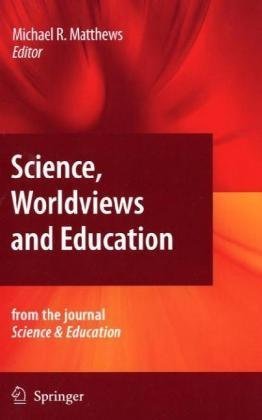

Most ebook files are in PDF format, so you can easily read them using various software such as Foxit Reader or directly on the Google Chrome browser.
Some ebook files are released by publishers in other formats such as .awz, .mobi, .epub, .fb2, etc. You may need to install specific software to read these formats on mobile/PC, such as Calibre.
Please read the tutorial at this link: https://ebookbell.com/faq
We offer FREE conversion to the popular formats you request; however, this may take some time. Therefore, right after payment, please email us, and we will try to provide the service as quickly as possible.
For some exceptional file formats or broken links (if any), please refrain from opening any disputes. Instead, email us first, and we will try to assist within a maximum of 6 hours.
EbookBell Team

0.0
0 reviewsScience, Worldviews and Education is an important and timely theme as many national and provincial education authorities are requiring that students learn about the Nature of Science (NOS), and that they learn about the broader historical and cultural contexts of science and its practice.
Such topics give rise to questions about science and worldviews: What is a worldview? Does science have a worldview? Are there specific ontological, epistemological and ethical prerequisites for the conduct of science? How can scientific worldviews be reconciled with seemingly discordant religious and cultural worldviews?
Questions about science and worldviews have had a long history. The Galilean revolution, the Darwinian revolution, and the Einsteinian revolution were all associated with profound cultural, religious and philosophical transformations and debates. The European Enlightenment was the first such major impact.
Globalisation and the science-based industrialization of many non-Western societies, with their own religious traditions and worldviews, make urgent the understanding of science and its inter-relation with worldviews, and for the development of informed and appropriate science education.
Contributors to this anthology include scientists, philosophers, theologians, and educators. They all share the conviction that science education has to promote a richer understanding of science and its relations with culture, religion, philosophy, and ultimately the worldview of students.
What is a scientific worldview? How does it differ from other worldviews? Is it possible to be educated in science yet lack a scientific worldview? Can science thrive in a society where such a worldview is lacking? These questions and more are discussed in depth by a distinguished group of scientists, philosophers, educators and theologians in this uniquely valuable volume.
Albert H. Teich, Director, Science & Policy Programs, American Association for the Advancement of Science, USA
This wide ranging collection of essays is an excellent way to enter the too often neglected territory of how science and science education relate to larger socio-cultural world views.
Peter Machamer, Department of History and Philosophy of Science, University of Pittsburgh, USA